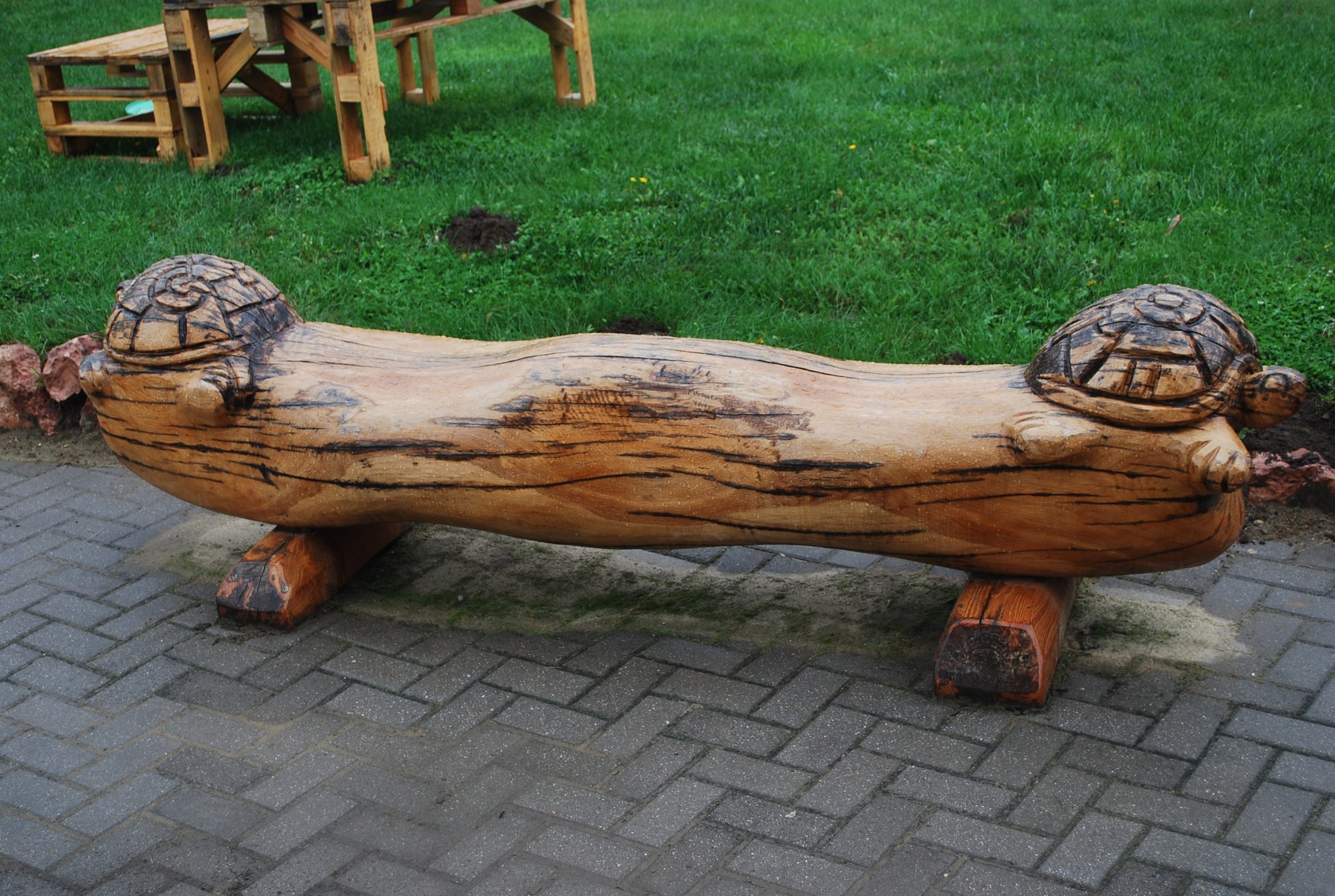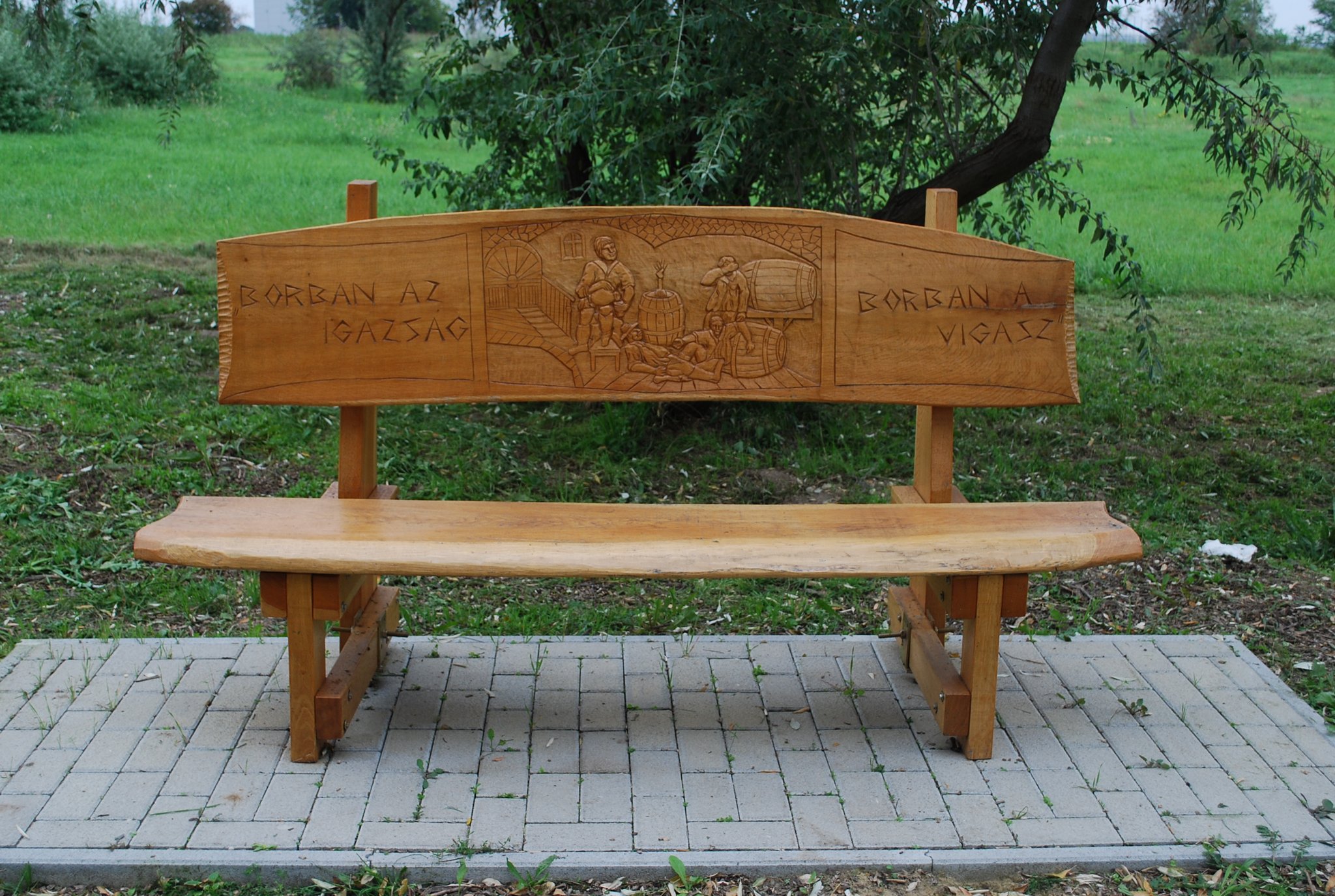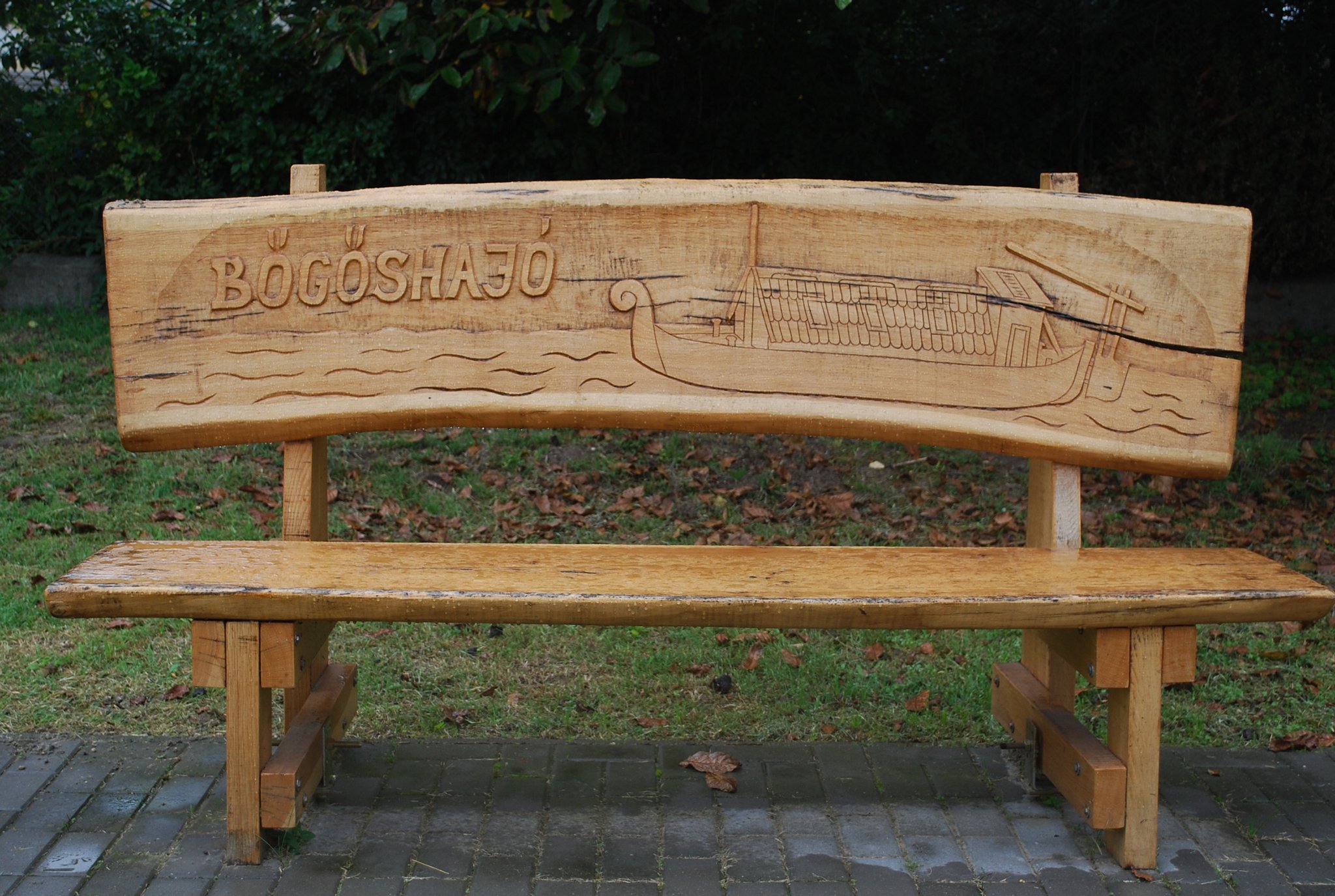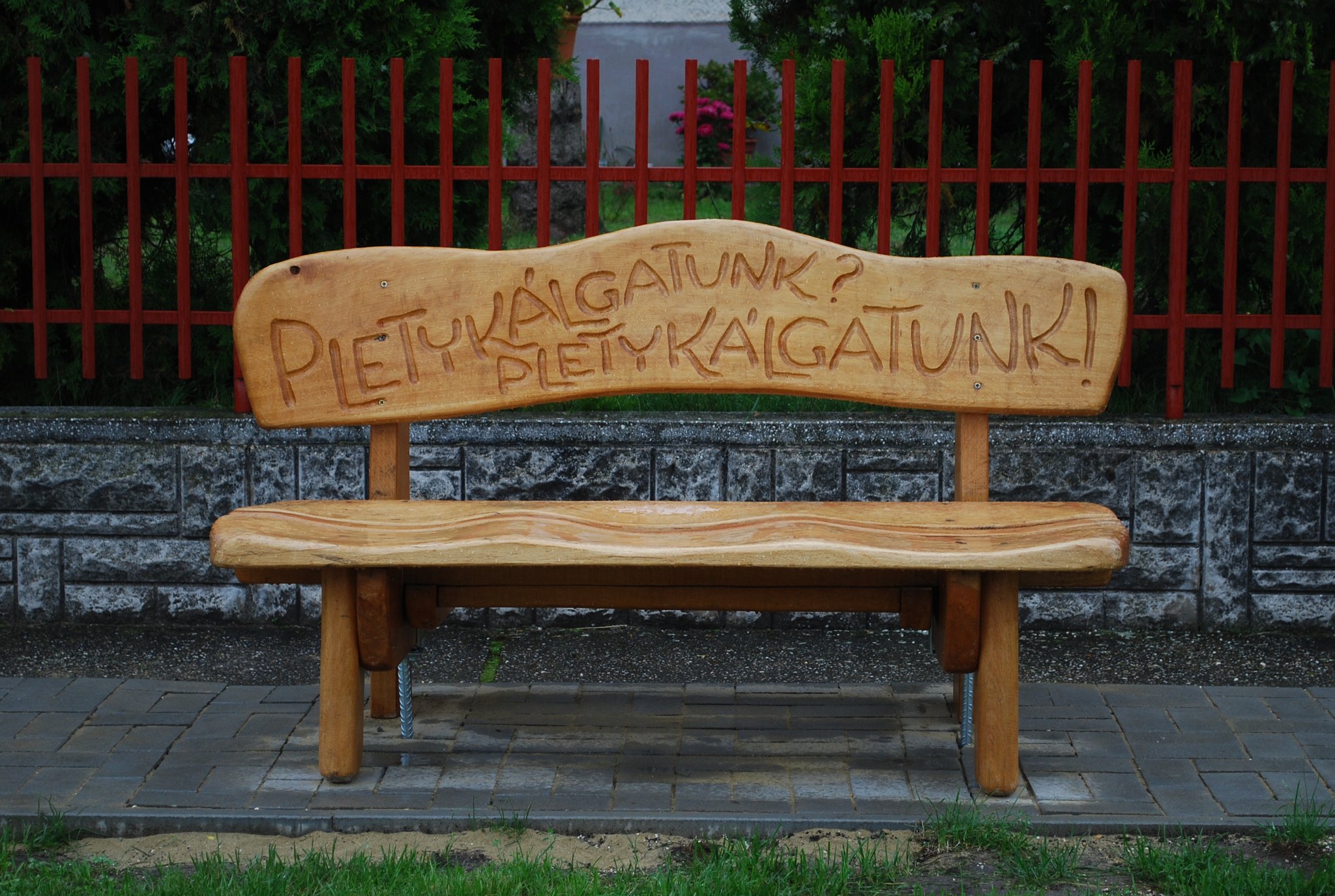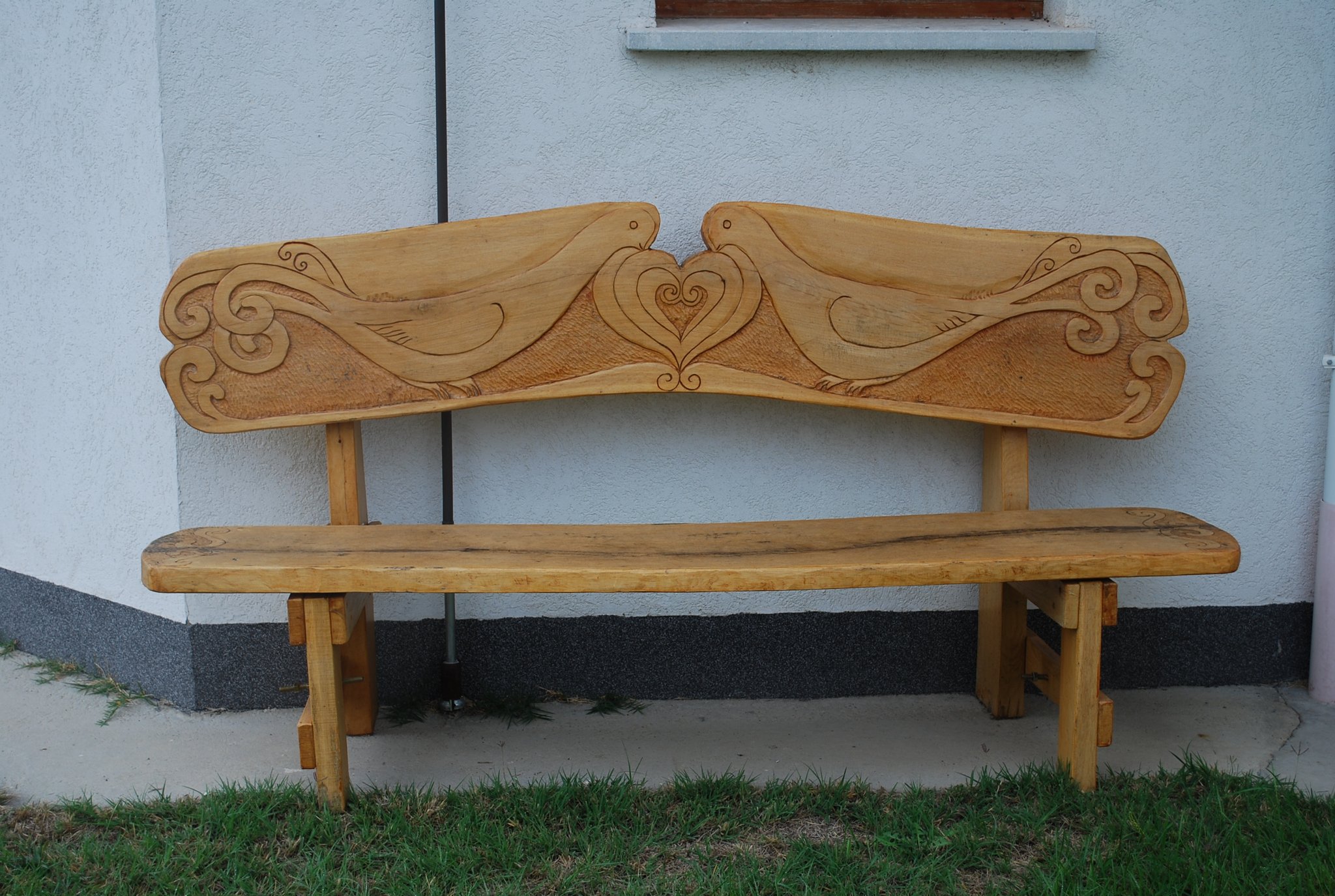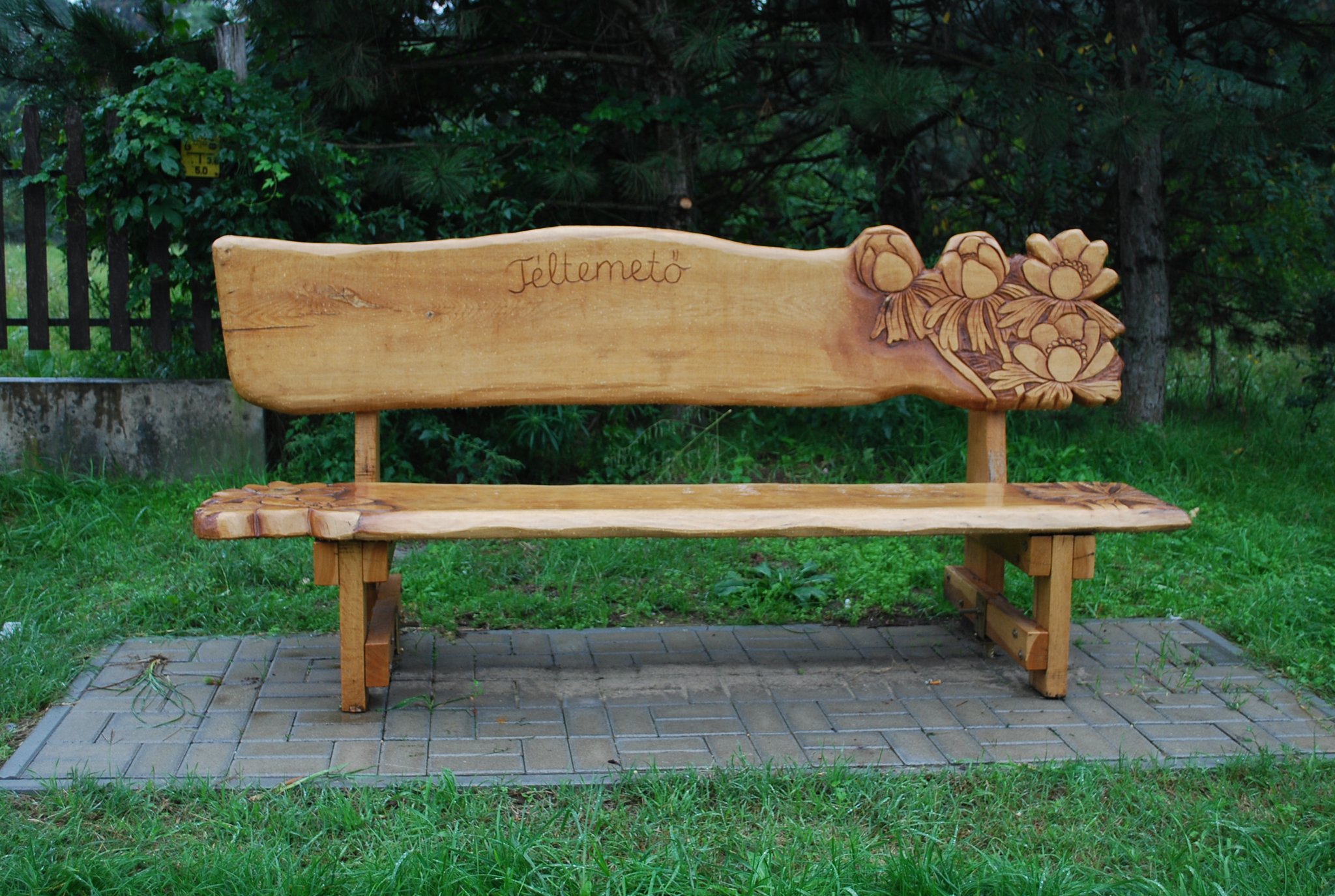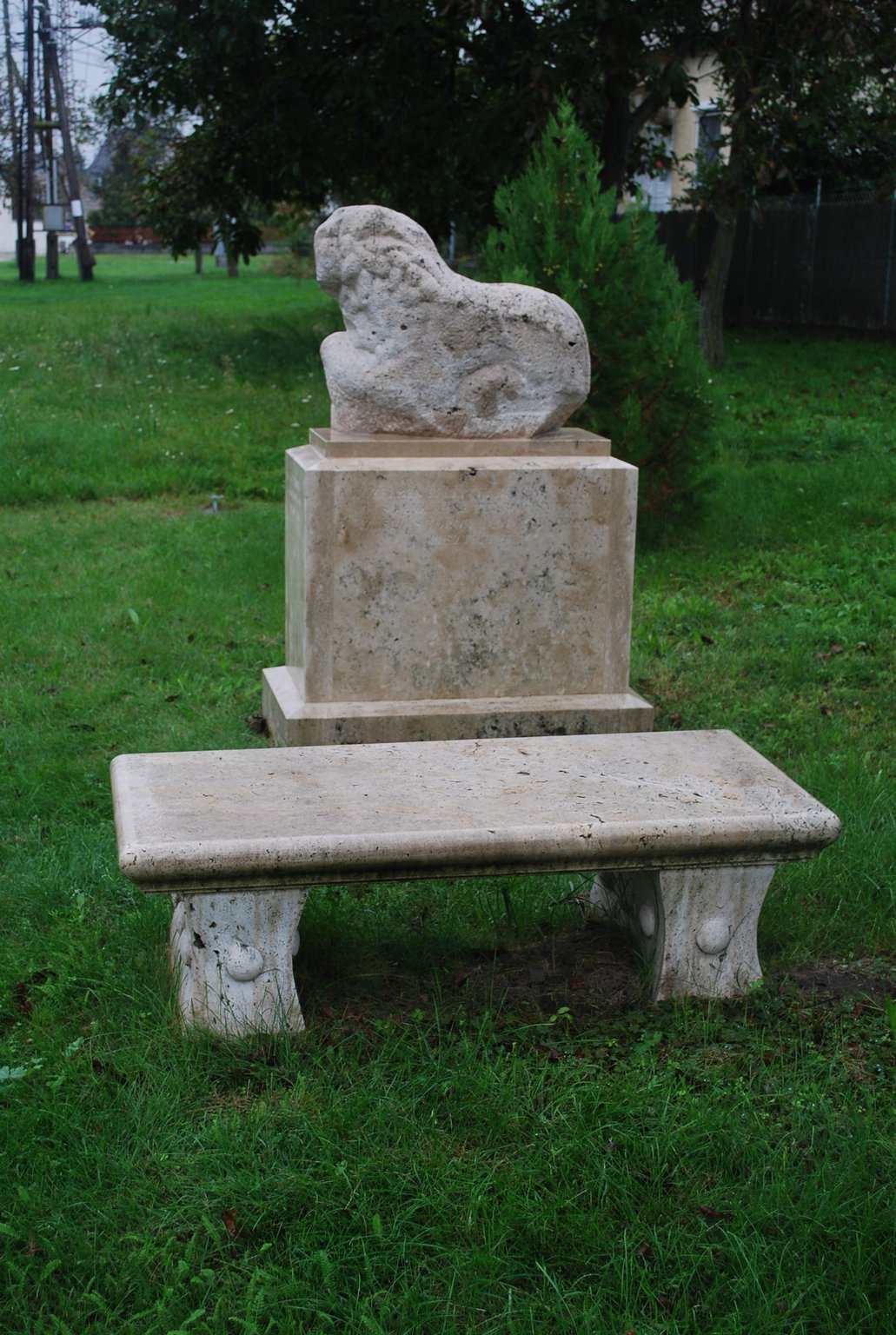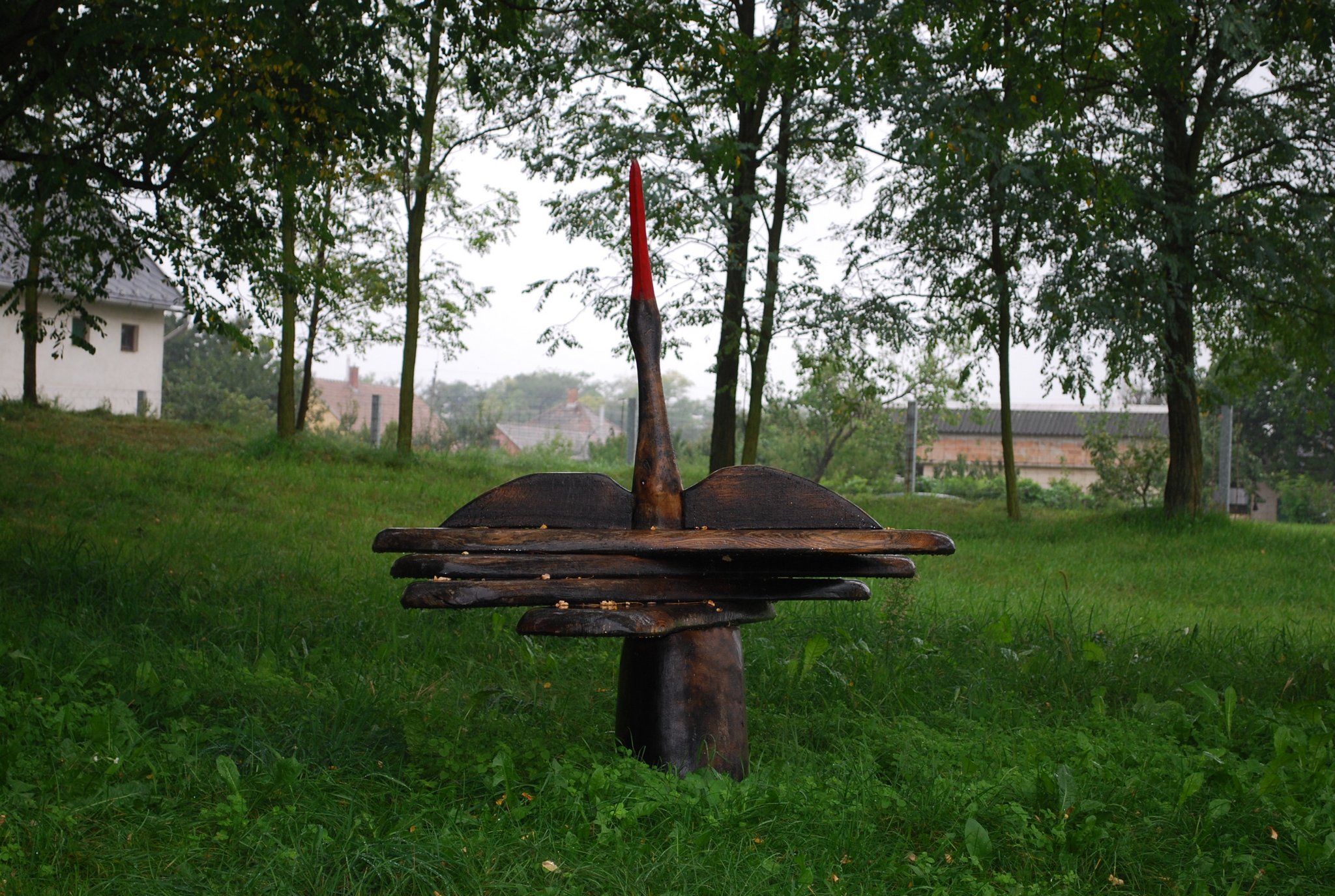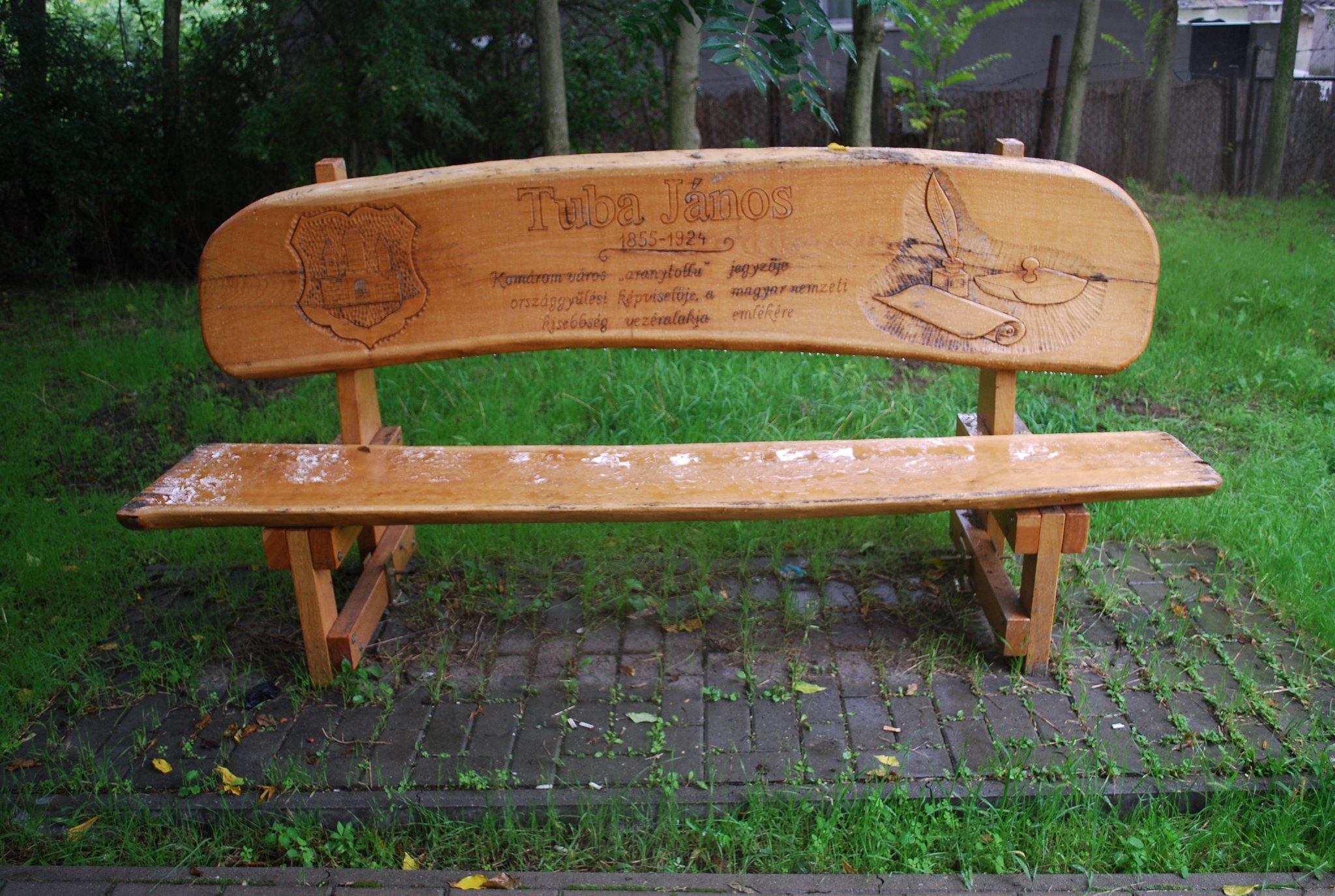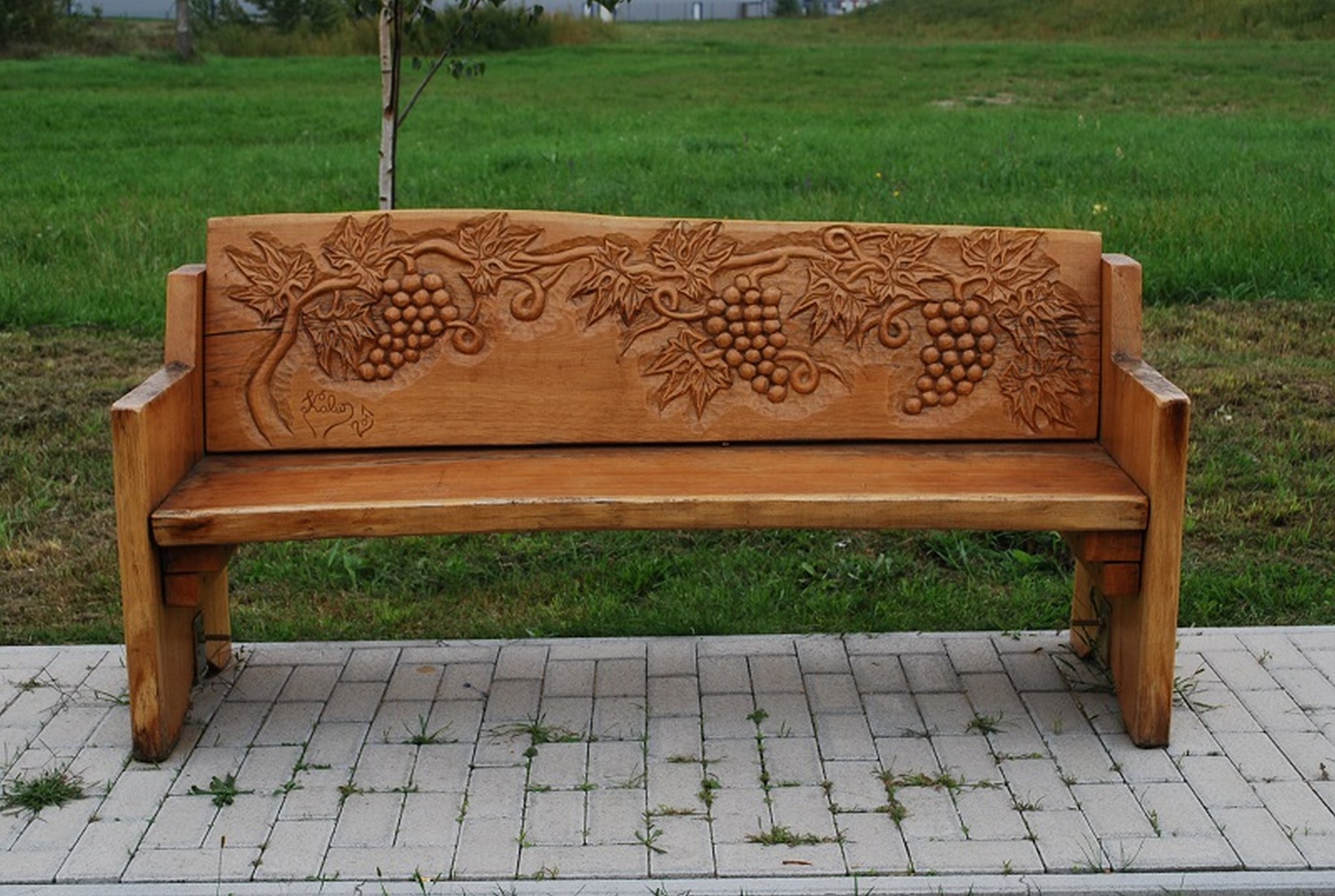Legends
The bench of Trianon
by Gálné Rózsehegyi Irén
Just ten years ago I got to Paris. In flying three days I succeeded to visit every monuments. I kept Versailles for the last day to see the palaces and the wonderful parks surrounding them, primarily XIV. Louis the Sun King’s palace. It was a great experience, it seemed like an airy-fairy dream, and what I saw, made France resp. Paris unforgottable to me.
The Big Trianon Castle is located at a hidden part of Versailles’ castle grounds. In 4th July 1920. the Treaty of Peace was signed by the leaders of Hungarian delegacy; Drasche-Lázár Alfréd extraordinary envoy and Benárd Ágoston Minister of Social Welfare. This conclusion of peace to terminate the I. World War was forced on us; it caused excessive loss of territory, ignoring ethnic borders as well.
We had known just a few about Trianon for a long time, it wasn’t allowed to be concerned with this issue, so we hardly received any information could be considered authentic.
Thus either I could connect only much later my childhood experiences to Trianon.
1962-ben, ötéves koromban költöztünk Nagyigmándról Komáromba. Ma is élénken élnek az emlékeimben kompos utazásaink: a Dunán át komppal „hajóztunk át” Komárnóba, ahova csak útlevélvizsgálat után léphettünk be. Számomra ez akkor teljesen természetes volt. Útlevéllel még sokszor – de akkor már az elkészült Duna-hídon – átmentünk Jókai városába, a komáromi Öregvárat is többször végigjártuk, a Klapka Györgyről elnevezett tér kedvenc kiindulópontunk lett.
Shopping wasn’t difficult, at that place and time the sellers weren’t conceal they spoke Hungarian.
The Danube became the border of the divided town; which had been one before, were split into two!
One of my dearest memories is visiting my grandmother who lived in Bábolna. Even now I can evoke the big, tidy kitchen, what was the central part of the house, the larder and the living room opened from here. I can smell the delicious, sweet scent of tea, and taste the foods in my mouth. Ever since I haven’t eaten so tasty smoked sausage and squeeze cheese as my grandmother’s.
There was a nice big round glassed veranda at the entrance of the house with a couch, table and some flowers. My grandfather used to relax there reading or sleeping. I don’t remember him, but I know from my father he fought in the I. World War. On the table in the veranda was a bright, shiny, gold-colored chalice! On that chalice there was the name of my grandfather and a short descriprion about how he had earned the title in front of his name: Valiant (’Vitéz’) Rózsahegyi Mihály!
Even now we keep the binoculars wherewith my grandfather were watching the battlefield of Isonzo.
This year we commemorated the 100th anniversary of the outbreak of the war. We all know the consequences well.
In a later period of my life, but before 1989, I heard a lot of interesting stories from my husband’s parents, such stories which couldn’t be read in history books. My husband’s parents met each other at Máramarossziget (Sighetu Marmației), they both had got there as young teachers during the reannexation of Transylvania in 1940.
Máramarossziget (Sighetu Marmației) had been a Hungarian township for centuries, but after Trianon it was attached to Romania like many other Hungarian towns and villages with their population as well.
My mother-in-law taught in such school where native Hungarian, Jewish, German and Romanian children got along well with each other. It wasn’t simple, it wasn’t easy to foster and educate the students with different cultures, from families with different financial situations, but my mother-in-law who was very young then, controlled every difficulties ably and snappily with an exceptional pedagogical sense.
She actively took part even in the saving of Jews.
After the II. World War this area, just like the other reannexed areas became the part of the adjacent country.
And one last personal memory, which connects me - the simple, contemplative person,
spared from the war’s horrors - with long threads to Trianon.
In the end of the 80’s I met a Transylvanian person, who had ran away to Hungary with her husband from the dictatorship of Ceausescu. She’s a Hungarian person, respectively a true, soulful, well-learned, big-hearted Transylvanian PERSON from Marosvásárhely (Targu Mures), who can be considered as a very good friend of me for a long time. By her I got to know the transborder Hungarians, and I know they are often more Hungarian Hungarians then us!
Trianon divided the Hungarian areas, however it connects Hungarian to Hungarian with tight, untearable threads.
Lately I went to Koppánymonostor, I took a seat on the bench of Trianon, and I was thinking about the old memories with love. Trianon could mean different things to each people, but while sitting on the bench we can not only evoke the dry facts of history, but the personal connections, painful or touching memories could outcrop as well from the depths of past.
We can feel the justice of the BENCH specially here, next to Komárom. Though nowadays we can walk through bridge Erzsébet from Komárom to Komárom (Komárno) undisturbedly any time.
Cellar tour
by Berecz Anna
So the story is that I visited Sanyi. He offered me wine, but not just whatsoever wine, he brought up from the cellar the best, the fresh, the red, the white, the fragrant, the local, the neighbour’s, the Jóska’s, and all. I wanted to help him so I asked a few guys from the street to come with me to the cellar and help with bringing up the wines. So then it happened that we went down and we were opening bottles, grabbed their necks and there was popping, running, snuffling, swallowing, it dissapeared and blushed suddenly.
Then Erzsi came somewhen in the evening, she quarreled with Sanyi and slammed the cellar’s door on us. We weren’t so sad, we continued drinking. At least thereafter we had a reason. Sanyi found his tongue and told us what was wrong with Erzsi; so Mari had visited her last day and had told her about every bloomers of Jóska. Jóska immediately corrected us and however we were in the cellar, he was whispering: – It wasn’t like that – So we learned the original, much more filthy version, and we all believed Jóska after Pista confirmed that he had seen everything from the kitchen-garden. Then it turned out Erzsi was hiding Pista there when Jóska unexpectedly staggered home from the place called pub in common language, and called ’Közösségi Élettér’ (Community Living Space) among us, good friends. Well as you can see, everything turned out, we discussed all, it lasted long but we ascertained – in vino veritas.
The hope of the fortress city
Stories from the War of Independence era
by Jónás Dániel
We may not even realize it, but sometimes our actions are not entirely controlled by us. There are certain places where certain things have happened somewhen. These places – though invisibly – have been bearing the events for eternity and this can affect people who get there. This is how things like erecting a monument at a seemingly random place can happen. And no one would think that a few square meters of space was truly an important point of in the lives of the people they remember of.
**
On a nice, early sprig day there weren’t any clouds in the sky, the sunlight were dancing on the slowly drifting Danube. A boy in his twenties was standing on the right bank of the venerable river, looking from there at the city on the other side and the long-drawn horizon at the same time. The breeze was whispering slowly in the weedy grass and carrying with it the spring heat rather than the late winter frost.
She will come. – calmed himself the young man as he were waiting for his sweetheart in the afternoon sunlight. Although her parents were strict, Teri was always able to provide clever explanations, so that they could meet. Feri and Teri have been together for almost a year, but her parents were really disapprobative regarding this relationship. And now, because of the revolution, the whole city of Komárom is more tense. – thought the young man. The girl’s parents – to put it mildly – were faithful imperialists, as was their whole family. Feri and his family on the other hand agreed with the revolution and gladly stood up for the cause of freedom. Teri – notedly her parents – were trying to hide their political stance, as the whole city was burning from the heat of the War of Independence. That wouldn’t be a problem – Feri thought – but the commander of the castle, Wilhelm Mertz was of Austrian descent and was absolutely loyal to the king. The relationship between the city and the castle has been very tense since the happenings in Pest, which is inappropriate – he shook his head. But this idea was interrupted, because Feri noticed his love approaching from afar. He hurried to her, then they happily greeted each other with a kiss.
- Well, you are here! – the young man cheered.
- Of course I came! – Teri cuddled her lover. – But there are interesting rumours in the city, and I overheard my parents about it, that’s why I was late.
- Is it so important?
- I don’t know if it’s true. – the young girl shrugged. – Interesting anyway. It is rumoured that a hooded guy, who has been enjoying the hospitality of Csillagerőd (Fort Star) for a while, will head for Vienna tonight.
- Who is that? – Feri wondered. – Maybe a spy?
- Not really. Supposedly that is General Ignaz Lederer himself has come to the castle to visit Mertz. They say he has escaped from Pest, because they wanted to impeach him for breaking up the protesters.
- But that was Mertz who has just asked the General to help because of us. – Feri was smiling. – Because the people in this town are mostly commited to the revolution.
Theresa shrugged.
- That’s what I heard. I don’t know what’s true about it, but my parents are quite informed about such issues, so it is possible.
- You’re a smart girl. – Feri hugged the young woman. – What should we do today, my love?
- Let’s cuddle and look at the clouds! – She exclaimed and grabbed her lover’s hand to go a few feet away and lay together on a peculiar mixture of grass and weed.
- What if your parents would realize you meet me in secret? – Feri was thinking out loud a few minutes later.
- They won’t realize. – Came the reassuring answer. – Who would look for us here, on the other side of the Danube, not far from the sand hill?
- I think no one. – The young man smiled.
They only finished daydreaming late in the afternoon, when the sun was halfway down, so they could return to the town before dusk.
—
Three months later, in the blazing summer sunshine Feri was waiting for Teri at the usual place, now more than ever. The devastating fire of a few days has further fueled the rivalry between the castle and the citizens. Everyone believed that only the inhabitants of the castle could be responsible for the disaster. Feri was looking at the Danube and he was staring at nowhere. He had applied to be a national guard and he would be in the castle in a few days. The young couple used to meet at this place twice a week, but now the young man was waiting for his love more than ever. The fire broke out the day after their last date, not far from Teri’s home. And now that he was about to enter the army, he was even more worried about their relationship. If the girl’s parents find out…
- Hello my love! – Teri greeted her partner.
- Hello! – Feri suddenly came back from thinking, and hugged the young woman tightly. – Are you all right?
- Why aren’t I? – she wondered.
- Well, the fire was not far from you. But thank God you are all right!
- I’m fine. – Teréz smiled and kissed Feri’s face.
- I need to tell you something. – Feri changed the subject suddenly and looked at the river again. I volunteered. In a few days I will take an oath together with the other soldiers to the Hungarian constitution.
- Then we won’t be able to meet. – The girl desponded.
- I’m sorry but you have to understand. I feel that it’s my duty to stand up for our freedom. If your parents find out, maybe it would be over for us forever, but…
Feri couldn’t finish, because his love suddenly kissed her softly and lovingly. As they were standing there kissing in the summer heat, with barely blowing breeze in the middle of nowhere, the lovers felt that only they existed in the world.
- They’ll know, after you will have joined the army, I will tell them myself. – said Teréz after they finished kissing.
- Why? – the young man’s eyes widened.
- Because somehow I also want to support the War of Independence. Unless otherwise, at least I will dare to tell my imperialist parents that my love is a Hungarian soldier.
Feri hardly believed his ears, but at the same time he was pleased about the heard words. She stands by him, just as he always has stood by her.
- Anyway – Teri continued – will Mertz go away from here?
- Yes, now they are forced to. The commander had allowed himself too much when he aimed cannons at the town last month. Recently more than two thousand soldiers arreived, led by wing lieutenant-colonel Majthényi, moreover they brought a paper personally received from Prime Minister Batthyány Lajos ordering Mertz to hand over the castle. – Feri shook his head. – For this he didn’t let them in, and then he dared to call Austrian troops from Gönyű to help him.
- But as far as I know, he didn’t succeed. – The young woman frowned.
- No because the mayor had somehow learned about the plan and dismantled the bridge, so the troops couldn’t passed through the castle.
Teri’s glaze moved across the river toward the fields.
- How do you think it will end? Can we win?
- I belive with all my heart that we have a chance to achieve freedom. So that we can raise our children in a free Hungary.
The young girl looked at Feri but said nothing. She smiled and hugged her dear lover even more tightly.
—
Twice a week, a young girl waited not far from Monostor's sandhill, not even winter and cold could discourage her from meeting him. She saw more and more Hungarian national guardsmen and citizens around the sandhill as they were carrying soil, and every time she came here she always hoped that her partner would be there. It was agreed that she would be here every week at the usual time, and as soon as he could, the man would appear. The moment came only a quarter of a year later, and the young soldier found his lover there. The months passed since the last meeting have only further strengthened the bond between them, and they burst into tears at the reunion.
- I can finally see you again, my love! – Feri hugged her tightly.
- I was so worried about you! –The young lady returned the hug.
- I'm sorry you had to wait so much for me, but I couldn't come sooner!
- Homeland is the first. – There were tears in Teri's eyes. – Tell me how are you? What happened to you?
- I saw Kossuth and Bem! They were here in the castle.
- Yes, Kossuth performed a recruiting speech one day for the people of the city. It was really inspiring.
- Did you listen? – Feri wondered and was proud of his love. – And what did your parents say about that? Anyway… do they know what's going on with me?
- Yes, I was proud to announce at home that you joined the army.
- And? – The young man swallowed.
- Well, they both scolded me and forbade me to talk to you from now on. – Seeing Feri's sad eyes, she caressed his face. – But luckily they don't know where I go at this time, they think I meet Juli.
- And does she know about us?
- Of course, she promised that if my parents would ask her, she would confess the same as me. – The girl assured him.
Teri looked at the sandhill, where she saw people moving again.
- Tell me what you're doing so hard?
- At the command of the Lieutenant Colonel, we will reinforce the sandhill with sand chains. The town must be secured from all sides, because the imperial troops have already started against us.
Her eyes stared into the distance for a few moments, then she jumped into Feri's neck with renewed energy.
- Oh my love, I'm so glad we're finally together! – She said. – When will we meet again?
- Unfortunately, I don't know when will I come again. I am here now because I have been assigned to carry the soil. I told one of my mates about our case and he told me he would work instead of both of us, so that I can visit you.
- Then he's a very nice man. –Teréz nodded appreciatively.
- Yes, he is. And what do we do today, dear? Lying down and looking at the clouds? – Feri smiled.
- Yes, I really like it! – Teri agreed and she and his lover lied on the weedy grass, which was cold though, didn't bother them at all.
After about half an hour, Feri stood up, dusted himself off and asked the girl to stand up.
- Teri, I want to ask you a very important question.
- What's wrong? – The young lady scared.
- No problem. – Feri smiled. – But – the young man knelt in front of his partner – Teri, would you marry me?
To her astonishment, the young woman didn't even know what to do, she was so surprised by the question. However, after a few seconds, she said the obvious answer:
- Yes!
Hearing this, Feri straightened up, grabbed his future wife and spun with her in the air. This is where they kissed each other for the first time, so they have always met here, and now this is where he proposed to her. Feri looked over the shoulder of his newfound fiancé at the sandhill. He felt that from this happiness, he alone would confront the entire imperial army. The young man looked confidently into the future. He thought they had every chance of winning the War of Independence.
**
23rd of April 1849.
After nightfall, three figures sneaked out from Komárom castle, and headed west. After about forty-five minutes of an accelerated walk, they hurried down to the bank of Danube. There was a boat swinging on the water as if it has been waiting for them. They looked around for eyewitnesses, then they quickly stepped into the boat, two of them grabbed the paddles, the third squatted in the fore, and they headed for the other side in a hurry.
- So what's the plan? – asked the one who didn't paddle.
- I'll stay in the boat. – one of his companions replied while fiercely struggling against the drifting of the river. – and you are assessing the terrain and then coming back as soon as you can. We must return to the castle before dawn!
Then they didn't speak, they just listened to the slow flow of the Danube and the sound of the boat gliding between the waves. It did not take ten minutes and they reached the right bank of the river.
- Be very careful! – whispered the man who had just outlined the plan, and the other two landed and headed south.
The two men was sneaking until they saw lights in the distance.
- That's the sandhill. – one of them pointed east. – From there, the town was cannoned for a month.
- Fortunately, it stopped a few days ago. – the other murmured. – It would have been a shame for us if a stray cannonball hit us in the middle of the Danube.
For a few moments, they listened only to the chirping of the crickets, and then the man who had just talked, started talking again:
- Do you think they'll start again?
- Not likely. – the other looked very strongly toward the sand hill. – I think they have realized it was completely unnecessary to bomb the city, the Komaromians would not be broken anyway. – he smiled. – You can shoot, German, but you won't come in.
- We should get closer. – the other changed the topic. – We can't see much from here.
- It's a good place in turn.
- What do you think?
- Feri proposed to Teréz here.
- How do you know they were right here? – the other wondered.
- Do you see this rock? – the man looked at a bigger rock. – A heart is scratched on it. They did it to mark this place.
- It will wear off and the rain will wash it off.
- Sure. – he smiled. – But that means a lot to them.
- We shall stop talking, because we're running out of time. – he mumbled. – As soon as it dawns in the east, the boat must return, with or without us.
The other one didn't speak, just nodded and looked again at the lights of the sandhill.
- Let's go to that direction. Welden's camp is probably in Ács, like Simunich's. It's too far to look around.
His companion nodded, and they both started softly toward the Austrian fire position. After a few minutes, they were examining the sandhill from the shelter of weeds and a few bushes. Only three people patrolled among the cannons, the rest were sleeping on the ground, scattered around a large campfire.
- It could be twenty cannons. – whispered one of the Hungarian soldiers.
- Yeah, and about fifty people with rifles here. – the other nodded.
- Look. – his partner pointed to the sleepers. – There are cannonballs and some ammunition for rifles.
For a few minutes they were looking at the camp silently, but they didn't notice anything interesting. There was nothing but the night-song of the crickets and the quiet steps of the three guards.
- I think that was it. – shrugged the man who had just speak. – Let's go back.
His companion looked over the sandhill once more, but after finding nothing interesting, he nodded and headed back to where they came from.
- We could have brought a binocular. – one of them said as they were halfway to the boat. – That would have given a closer look at the place.
- The general said not to bring anything outside of ourselves. Not even a gun, because if it comes to fighting, it's better to run. He is right, because on this bank of the river the Austrians are swarming, and we would have no chance.
- Wait. – the other stopped suddenly. – There couldn't be more than fifty on the sandhill. With Welden, there are no more than a hundred in Ács. Suppose there are Austrian places of arms along the Danube, with up to fifty people all the way to the Fort Star. But, according to the general's information, there are nearly one and a half thousand around Komárom! Where are the other people?
- We're locked in a siege ring. – the answer came. – They have places of arms at north, west, and even east of the city.
- And there are patrols. – an unknown voice came out with a strong accent.
The two Hungarian soldiers turned surprisedly, and they faced ten armed Austrians.
- Would you tell me why exactly you are here? – the previous voice with a mustache and bearded head asked – maybe he was a sergeant or a lieutenant.
There was no answer to the question, and the Hungarian national guards stood in place with a smooth face. They would have done anything in vain when ten loaded rifles aimed at them. For a few moments, people looked at each other in silence, and then the Austrian army officer smiled.
- Don't you understand what I'm saying? – he shouted into the night. – If you'll answer, I'll take you to the camp sergeant, who will probably treat you kindly. If you won't, I will deal with the problem. – while saying the last few words, he were half-smiling under his moustache.
There was silence again. The Hungarian soldiers, as if they had not heard it, stood in their place motionless like a stone. Secretly, both of them hoped that their third partner would be able to get back on the boat in time before they find him. But in those few silent seconds, a gunfire roared into the night. Even the captured soldiers raised their heads up, when an Austrian rifle fired, and the bullet drilled straight into a heart engraved on a rock.
- Are you crazy? – exclaimed his commander. – You almost hit me!
- Excuse me sir. – the owner of the firearm stammered. – It was a coincidence, a stone hit me on the head.
- Saying a stone hit you on the he... – but the army officer couldn't finish the sentence, because he was also hit on the head by a flying gravel.
- Catch the attacker immediately! – he ordered the soldiers. – One of you stay with me to keep an eye on our young birds. Something tells me that you are not just two. – he hissed his last sentence threateningly and addressed them to the two Hungarian soldiers.
For a few moments, nothing could be heard but the Austrian cries in the night as they made their way to the Danube. Then suddenly another stone hit the last gunman straight on his eye. To his surprise and pain, the soldier dropped his weapon and fell to his knees. The Austrian army officer immediately reached for the pistol in his belt, but could not reach it, because one of the captives got him on the waist and beat him to the ground. The commander reacted quickly, and while lying on the ground, he punched his attacker. Meanwhile, the other Hungarian patrolman stepped to the fighters and quickly ripped off the pistol from the Austrian's belt, stepped to the soldier who was trying to stand up while still feeling pain in his eyes, and simply slapped him on his nape with the gun. He fainted immediately. Then the Hungarian turned back to the people on the ground, grabbed the pistol and aimed the target – in case the Austrian won the fight. Fortunately, the gun did not need to be fired, because his companion defeated the army officer first with his elbow and then with a right-handed straight punch.
- Is he dead? – Came the third man, who would have a place on the boat.
- No. – The winner of the fight stood up. – I hit him on his temple, so he fainted.
- Quick, let's back to the boat and head to the other side. – The patrol grabbed the gun and threw it on the grass next to the Austrian. – We're not collecting memories. – He added.
His companions nodded, and they all returned to the boat in a hurry. The other soldiers had probably turned back already, because their voices could be heard more and more.
- Did you help? – The patrols asked their mate, who had turned up unexpectedly, as they took their place in the boat and headed across the river.
- Yes.
- And where did the stones come from?
- We couldn't bring a gun, but since childhood I had been always carrying my slingshot, which my great-grandfather made for me. He said it would be very useful one time. So I always had been keeping it with me and practicing a lot with it.
- And he was right. – The other two nodded seriously.
Nothing was said from this point, even as they landed and moored the boat – as if it had been swaying peacefully all night. When the bottom of the sky seemed to be brighten in the east, there had been already a secret discussion ongoing about the events of overnight at the Komárom Castle. Two generals gave appreciative words to three brave soldiers of Komárom. The Hungarian soldiers gratefully listened the words, although they were well aware that they could not receive more than commendations for their actions. This mission, as important as it was, was so secret - and perhaps their story will disappear forever.
**
The leaves fall off, but the chains do not. A gray old man sighed as he looked at the trees and bushes slowly preparing for winter. The old man was sitting on a rock that he did not even know had been shot a few months ago by an Austrian rifle. Not far from it, the only completed bastion of the Sandhill Fortress stood lonely.
- I should start slowly. – He murmured loudly, because the elderly could afford to talk to themselves without being viewed as a fool.
- But for some reason, I feel like I have to stay. – he thought. – As if I had to wait for something important. Or do my poor legs just think it would be nice to sit here?
In the end, however, he was sitting there until dusk and thinking about the country and the future of the Hungarians. Klapka has the wits and won't sacrifice the lives of more soldiers. He will come to an agreement with that hyena and the castle will surrender. And then the War of Independence will be finally over. – He thought bitterly. – I beg you, God of Hungary, protect my grandson from death! My poor wife hasn't slept well since the child came to be a soldier. Sure, we are proud of him, but would we be afraid? His parents had died long ago, and we raised him. Please God, take care of him for a few more days! We will put the gun down soon anyway – and all of Europe will be quiet again.
His thoughts were interrupted by the noise of approaching footsteps mingling with the noise of the escalating night, which could be heard from two directions – one from the east and one from the west. Two men met at a distance of barely ten meters from the old man sitting on the rock. Both of them looked around to see if anyone was following them, and only the devil knows why they didn't notice the gray man. Maybe the night itself had hidden him from their eyes.
- Negotiations have failed. – Began the one who came from the west. – Hungarians think they can ask for anything, but the lieutenant general is not a fool. The fighting continues.
- It could be expected. – The other one said coldly.
- The lieutenant general and the Russian general also believe that the war must be brought to an end as soon as possible.
- What do you mean?
- You have to get into the castle and kill Klapka. We are sure that without him Komárom will fall.
- You are not asking for a small thing.
- You will receive your reward for your efforts.
The old man saw that the latter speaking man gave some banknotes to the other, who took them almost uninterestingly and pocketed them, then turned a corner and headed back to where he had come from. The other man just watched the receding figure for a few moments, and then he started back too.
The old man was sitting still for a few minutes, thinking about what he had heard. It will be best if I notify the general as soon as possible. – he thought. – If the Austrians resort to such vile and rather risky means, they really want to end the fight. We urgently need to agree with them, otherwise God knows what else they will invent! – these thoughts ran through the old man's mind. It didn’t take a few seconds, and the old man was already on his feet to go back to the Fort Star that was currently his home. – I have to talk to the general in person. – he thought, hurrying toward his destination as his weak legs could bear. – Komárom can't be occupied! It is even better to surrender, of course, only under certain conditions. At the same time, it makes no sense for even more Hungarian soldiers to die for a fight we have already lost. – A picture of a stone Virgin flashed to his mind and an inscription. ’Nec arte, nec marte.’ The old man smiled as he recalled the meaning of the inscription: Neither by trick nor by force.
A komáromi bőgőshajó
Szabó Olivér
Miként, és miről kapta a bőgőshajó, Komárom büszkesége a nevét, nos erről sokan mondanak sokfélét. Úgy vagyunk ezzel, mint magának a városnak a nevével is, mindenki tudja, mi az igazság, és mindenki a sajátját véli valónak, de mégsem biztos benne igazán senki sem.
A bőgőshajónál is sokan úgy tudják, az orrtőkéjén lévő hajódísz csigaformájáról kapta a nevét, hiszen az éppen olyan, mint a hegedűk, nagybőgők orrdísze. Ez is egy igazság. De az is, amit most én mondok el, amit pedig én tudok valónak, vagy legalábbis annak hiszem.
Ha jól meggondolom, az egész a megátalkodott török világ után kezdődött. Komárom épphogy kiheverte a végvári évtizedeket, maga mögött tudta az ostromokat, máris ott volt a következő gond, tudniillik hogy mi is legyen a városból. Bányászváros ugye nem lehetett, hiszen mind a Gerecse, mind pedig a Zobor túlságosan is messze estek. A mezőgazdaság kecsegtető lehetett volna ugyan, hiszen sík vidék volt a környék, amerre a szem csak ellátott, azonban igen mocsaras is, a lecsapolásokra pedig akkoriban még nemigen gondolhattak. No, nem volt ez azért ilyen nagy dilemma, mint ahogy én most itt leírom, hiszen tudták azt a helyiek nagyon jól, már a törökök alatt is, hogy mi a város rendeltetése. Komárom katonái ugyanis zömében sajkások, vagy naszádosok, azaz hajóskatonák voltak. Mit csinál a katona, különösen a csajkás, ha éppen nem a törökkel hadakozik? Ha azt gondolja a kedves olvasó, hogy iszik, eszik, lányokat hajkurász, akkor bizony igen közel jár az igazsághoz. Ha éppen azt latolgatja, netán nem fosztogatta-e a török kézen lévő városok környékét, nos akkor sem téved nagyot. Ezek mellett azonban a komáromi katonák kereskedéssel is foglalkoztak. Pénzük ugyanis nem volt, Bécsnek pedig nem volt sürgős, hogy a magyar katonákat kifizesse. Ezért aztán gyakorta nem maradt más választás, mint kereskedéssel megszerezni a betevőt.
Mikor aztán elmúltak a háborús évek, egyértelművé vált a naszádosok számára, hogy immáron végleg szállítással kell foglalkozniuk. Kezdetben a hadihajókat alakították át teherhajókká, majd olasz és német mesteremberek okították a magyar hajóácsmestereket, vagy ahogyan akkoriban nevezték őket, supereket, miként lehet a legszebb s mégis legtökéletesebb szállítóhajókat elkészíteni. Pontos és precíz rajzokkal, mérésekkel készítettek el mindent a legutolsó deszkáig. Tetszettek is meg nem is a lakosoknak az új típúsú hajók, de nem igazán érezték magukénak őket. Különösek voltak a komáromi szemnek, még ha méretükben és minőségükben nem is volt rajtuk semmi kifogásolnivaló.
Élt akkortájt, az 1740-es évek táján egy Zay Fülöp nevezetű hajóács. Felmenői még hadihajókat eszkábáltak a törökök elleni harcokhoz, s ha már ácsolták, harcoltak is rajtuk. Naszádosvajdák, vitézek, kiváló mesterek voltak a városszerte híres Zay família családfáján megtalálhatóak. Mesélték, hogy a híres Csömöry Zay Ferenc, egykori naszádoskapitány is az ősei közé tartozott, de hogy ez így volt-e, pontosan ő sem tudta. Annyi azonban nyilvánvaló volt, hogy még békeidőben is igazi, makacs komáromi naszádosvér csörgedezett az ereiben. Azok vére, akik annak idején, ha az igazukról volt szó, még Bécsbe is felhajóztak, ha kell, személyesen a császártól kérjenek kihallgatást.
Zay Fülöp nem nézte jó szemmel, hogy külföldiek tanítják a mesterségre a komáromiakat. – Még egy Alföldi supernek sem engedném meg, hogy kiokítson, nemhogy egy németnek, vagy taljánnak – mondta gyakran munka közben, mikor arról kérdezték, miért nem fogad el legalább egy kis segítséget.
Amikor pedig a fülébe jutott, hogy az idegen ácsok azzal hencegnek, hogy az övéké a legprecízebb, legnagyobb, legszebb hajó a Dunán, igen nagy méreg futotta el. Azt mesélik, elköltöztette az egész műhelyét a várostól északra lévő Apáli szigethez a Vág folyó partjára, és ott nagy titokban fogott a munkálatokhoz. Lemondta az összes addigi megrendelését, és még őröket is állíttatott a környékre, nehogy egynéhány külhoni mesterember meglesse, mit csinál. Mindenki csak találgatott, mi lelhette a híres supert. Egyesek szerint megőrült, és Trója híres falovát akarja vízen úszó monstrumként megcsinálni, mint valami komáromi dunai víziló. Mások úgy gondolták, nem is csinál ő semmit sem, csak kivárja, míg elvonulnak a vetélytársak, és ő újra egymaga lehet a legjobb hajóács a városban.
Egy kerek esztendő is eltelt talán, mikor először hallatott magáról a városban. Addig munkásaival szállíttatta fel a szükséges dolgokat a rejtekébe. Nagy látványosan, több szekérrel bevonult a hajóácssereg a városba el egészen a Szent András templomhoz, ahol is, mint valami komáromi Luther Márton, kifüggesztett egy hatalmas papírost. Akik akkor odamentek, a következőket olvashatták rajta:
“Komáromi feleim, és talján, német felebarátaim! Mindennek megvan a maga tsudája, és mindennek megvan a maga helye is. Családom évszázadoknak óta tanulja az átsmesterséget, és annak a szépsége éppen a tudásban van. Az mint a teremtő atyánk mindnyájunkot külön és külön léleknek teremtetett, úgy az én hajóim is mind egytől-egyig egyediek volának, és lesznek mindég is. Kézzel, és jó szemmel, szívvel kell a hajót tsinálni, nem pediglen mesterkélt mérőeszközökkel. Ki ezt nem hiszi, és engemet sültbolondnak tart, kérem holnap délelőtt tíz óra tájban a Vág és a Duna torkolatánál a vár tövében megjelenni legyen szíves!”
Volt is nagy sutyorgás, vajon milyen hajót ácsolt ez a Zay Ferenc. Az nem lehet, hogy az olasz mestereknél csak úgy szabad szemmel nagyobb és szebb hajót készítsen! A külhoni super urak, miután lefordíttatták a szöveget, csak kacagtak, s legtöbbjük mindenki füle hallatára kijelentette, hogy ez az ember megbolondult, és márpedig csakis az aprólékos méréseken, pontos tervezésen múlik minden hajó sorsa. Az olaszok azt, hogy egy magyar ember esetleg szemre tetszetősebb hajót építsen, mint ők, kik a reneszánsz hazájából jöttek, egyenesen sértésnek vették.
Amikor másnap a tömeg elé beúszott a hatalmas, majd hatvan méter hosszú, meseszép hajó, ámultak a lakosok, ámult a többi super. Nem volt ez a hajó sem szimmetrikus, sem alakra megtervezett, csupán a maga nyers valójában szép volt. Mintha egy mesébeillő falusi ház úszott volna előttük. A hajó bálványát, azaz az orrát szépen faragott csigadísz uralta. Maga a rakodótér olyan volt, mint egy sátortetős kis kunyhó, melynek tetejét mintha halpikkelyekből rakták volna ki. Végül hátul egy kissé magasabb épület, a csárda, a tulajdonképpeni lakrész volt kialakítva. A hatalmas kormánylapátokkal, árbócrúddal, díszekkel egyszerre volt rusztikus, mégis kecses és szépen faragott ez a szerfelett különös vízi jármű. Az összhatásban elvesztek az esetleges egyenetleségek, ferdeségek, de ha látszódtak is, inkább a hajó mesebeliségét, egyediségét emelték ki, mintsem elcsúfították volna. A partokon álló több ezres tömeg a kezdeti döbbent némaság után végül óriási hurrákban és éljenzésekben tört ki.
S hogy mit csináltak a külhoni mesterek. A legenda szerint egyszerre bőgött az összes olasz és német ácsmester. Ki a hajó szépségétől hatódott meg, ki a kecses orrdíszétől, ki pedig a vereség érzésétől. Több kisgyerek, kik, mint tudjuk kegyetlenül őszinték, kiáltoztak az idegen superekre mutogatva:
– Nézze édesanyám, ottan bőg a superbácsi! – így az egyik
– Odanézzen édesapám, bőgeti a mestereket a hajó, hát ez egy bőgőshajó!
Ez aztán rajt is ragadt Zay Ferenc hajóján, róla pedig később az a hír járta, nem másnak gyártotta a hajókat, mint az első komáromi mágnásnak, Domonkos Jánosnak, kiről pedig később Jókai az Aranyembert megformálta.
Én legalábbis így hallottam, s így tudom. Persze van aki szerint mégiscsak az orrdísz lesz a megoldás, mások szerint a hajókürt adott ki bőgő hangot, ez pedig az én történetem. Hogy melyik igaz, talán nem is az a lényeges, hiszen egy ha több története van egy dolognak, az nem csökkenti, de növeli az értékét.
Nem apad a pletykapad
Szabó Olivér
Stories from the War of Independence era
– Szép jó napot Locsoginé, jöjjön üljünk ide le,
Beszélgetni, én úgy érzem, éppen itt az ideje.
– Ne is mondja Fecseg asszony, olyan száraz már a szám,
Ha a pletyka jó bor volna, ültő helyben meginnám.
– Ezen drága Locsoginé segíteni épp tudok,
Olyat mondok, amin én már jó ideje mulatok.
Van a Miska, tudja aki majd hanyattdől, úgy iszik,
Tegnapelőtt látom ám, hogy kézben fogva úgy viszik,
Mint aki épp újraéli a csecsemős kiskorát,
Kiütötték, mert megfogta a Mariska tomporát.
– Ez is aztán jó történet, de ezt nézze Fecsegné,
Hogy mit láttam a templomban, mikor tegnap megyek bé!
Épp egy imát jó uramért elmondani gondoltam,
Mikoron is, amiközben Miatyánkot mormoltam,
Kit látok a gyóntatóból épp kijönni, mit gondol?
Keszeg Jóska jött ott elő, csakhogy épp inget gombol.
Utána meg Jámbor Klára, tiszta kóc volt a haja,
Ilyen muri másutt nincsen, egye meg a nyavaja!
– Jaj, az semmi, ezt figyelje Locsoginé asszonyom;
Nem messze a várerődben, hogy mi történt, megmondom.
Ott az egyik szép tüzértiszt a másikkal bajra kelt,
S a víváshoz használtak ők egy igen furcsa fegyvert.
Tüzérekként száz lépésről lőtték egymást ágyúval,
Első vérig, tartott ez az igen furcsa viadal.
Végül aztán az egyikük hasán egy nagy lyuk hasadt,
Olyakkora, hogy azt hitték, szegény tüzér ottmarad.
De nem így volt, már ott is volt ügyeskezű szanitéc,
Úgy bevarrta a hasfalát, stabil mint a kapuléc.
– Hogy mik vannak, jaj, de pikáns, és emellé igaz is,
De itt egy másik, olyan amin elképed még maga is.
Tegnap történt, ködös sötét, boszorkányos éjjelen,
Megyek épp a temetőben, erre uram megjelen’.
Pedig tudja, jó ideje meg van már, hogy meg is hótt’,
Mégis higgye, ahogy itt van, ő is éppen úgy ott vót’.
Rámnézett a két hatalmas bamba-kísértet szeme,
Én meg attól tartván, ez a szellem itt még megenne,
Szentőt vízzel meglocsoltam, kotródjon a fődbe le,
El is iszkolt, hogy megegye a mennydőrgős fittyfene.
– Jaj, hát drágám, milyen csúfos vérfagyasztó mese ez,
Minap én is éppen látám, két nagy kutya rám szemez.
Pál Piroska két kutyája, az volt a két bestia,
Mesélik, hogy az őnéki elvarázsolt két fia.
Bokor Pálné megátkozta őtet még a tavasszal,
Hogy a férje az ő méhét áldja meg két kuvasszal.
Azóta van, hogy a két eb a portáján sündörög,
S vonyítanak keservesen, ha az égbolt mennydörög.
Végtelenül ott a padon a sok pletyka így folyik,
Ha meghalnak a vénlányok, a stafétát átveszik
Más nénikék, kiknek nyelve egy végtelen rádió,
Amelyikből mint özönvíz szól hazugság dáridó.
Mátkaság padja
Gévay-Szűcs Ella
Hajdanában, vagy tán még annál is régebben, éppen kilenc emberöltő régiségben élt egy gyönyörű leányka a faluban, aki már olyan csodaszép volt totyogós korában is, hogy mindenki lefogadta a faluban, hogy majd kergetni fogják a legények. Hanem aztán egy napon, amikor a leány már igencsak felcseperedett, s kergették is kikapós legények, meghallotta ezt a falu boszorkánya, aki pontosan ezt a pillanatot választotta arra, hogy ennek az ügynek a végére járjon. Ment is, s amikor meglátta, hogy milyen gyönyörű is a leányka, rögtön elette a méreg, s ezért úgy döntött, hogy elátkozza a leányt:
– Te leány, ki újat mertél húzni hatalmammal, most elátkozlak! Kit csókoddal illetsz, az meghal. – s így lett. Persze ennek közel sem lett jó vége, hiszen a kikapós legények nem éppen azt kapták, amit vártak, mert egy csók miatt alaposan meghaltak. A leányzó elkeseredett, s mivel rájött, hogy átok ül rajta, ezért nem mert közel menni egy árva férfihoz sem, nehogy aztán egy szép napon kihaljon a falu. Hanem aztán történt az, hogy egy új legény érkezett a faluba, aki annyira megtetszett a leánynak, hogy rögtön szerelembe is esett. Ez a tény kínozta is, hiszen nem akarta, hogy szerelme véletlen belehaljon egy szerelmes csókba. Persze a legény is szerelemre lobbant a leány után, s éjjel nappal udvarolt neki, de a leány nem adta be a derekát. Egyszer találkoztak aztán az utcán, a beszédbe elegyedtek:
– Adjon Isten! – szólott a leány.
– Adjon! De mit adjon? Magát énnékem, például. – mondotta a legény.
– De kérem! Istenemre mondom, hogy nem lehet! – sopánkodott így a leányka.
– Kérem, csókoljon meg, mert ha nem teszi abba mentem belehalok! – kérlelte a legény.
– Inkább abba hal bele, ha megteszem. – s ezzel a leány el is futott. A legény pedig végső elkeseredésében egy padot kezdett el faragni, hogy mindenki láthassa, hogy mennyire szereti a leányt. Kilenc nap s kilenc éjjel csak faragta, de ez olyan gyönyörű pad lett, hogy csodájára járt ez egész falu. Közben a leányka, aki erről mit sem sejtett, elindult a piacra, de mit ad Isten, meglátta a csodálatosan szép padot, ami egyesek szerint olyan gyönyörű volt, mint maga a leány, s mivel fáradt volt, elég nagy késztetést érzett arra, hogy leüljön, s így is tett. Leült, s közben azon morfondírozott, hogy ki csinálhatta eme csodálatos padot. Meglátta ezt a legényt, s odament, és egy csókot lehelt a szájára. A leány önkívületben volt, hiszen a legény ebbe nem halt bele, ezután szó szót követett, csók csókot követett, s még aznap össze is házasodtak.
S azóta úgy tartják, hogy erre a padra üljön minden mátkapár, ki örök szerelemre vár…
Téltemető padja
Kukovecz Dorina
Annál a padnál váltak el egymástól. A lány azóta is minden évben pontosan ugyan azon a napon leül a padra, és várja, hogy édesapja hazatérjen. Öt év telt el azóta, de a háború és a hazát sújtó problémák nem múltak el. Egy levél se érkezett, egy képeslap se. Semmi. Anna mégis rendíthetetlenül hitte, hogy látja még édesapját valaha. De a front kiszámíthatatlan, nem lehet megelőzni a bajt, akárhogy is szeretnénk.
Anna már hajnalban kisétált a padhoz, ahol ígéretet tettek neki. A hó már elolvadt, de a csípős szél pirossá tette az arcát. Kezében egy pokrócot tartott.
Órákig várt ott. Nem keseredett el, tudta, hogy édesapja mindig betartja az ígéretét, akár- milyen hosszúra nyúlik is azt.
Anna érezte, hogy valaki megkocogtatja a vállát, rögtön felriadt révületéből, de nem apját látta mellette.
- Üdvözlöm, kisasszony. – Mosolyodott el a katona, akinek ötösével sorakoztak a kitüntetések a mellén. – Hoztam Önnek valamit.
Sötét színű öltönyéből egy levelet húzott ki, amit átadott a lánynak. Anna szíve megdobbant, mikor látta, hogy az apja küldte neki.
Remegő-fázós kézzel bontotta fel a levelet.
Anna drágám!
Sok minden történt az elmúlt időszakban, köszönöm, hogy ilyen sokáig hittél bennem. Ha megtehetném, az életem adnám azért, hogy legalább egyszer láthassalak.
Nem akarlak elkeseríteni, tudom milyen nehéz ez neked. Édesanyád bizonyára felhagyott a hiábavaló várakozással, de nem hibáztathatod érte.
Talán már több év is eltelt, hogy ezt a levelet megírtam. Mindent elkobozott tőlünk az ellenséges haderő, nem üzenhettünk. Csoportokban fogtak el minket, elszállítottak. Hónapokig vallattak minket, végül páran meg tudtunk szökni. Most egy kisfaluban húzzuk meg magunkat, de félek, hogy tudják, hol vagyunk. Nem tart már soká ez az őrület.
Szeretném, ha mindig szép emlékek árán emlékeznél rám, ahogy régen játszottunk, beszélgettünk, vagy csak öleltük egymást.
Kérlek, nézz magad elé. Mit látsz?
Anna felemelte könnyes szemét a fekete betűkről. Az olvadt hó között egy apró, sárga virág nyújtózkodott az ég felé, mintha csak a mennyekbe kívánkozna. Mintha már feladta volna az itteni létet, de pompás virága ereje teljében lenne.
Tovább olvasta a levelet. Már nem tartott soká.
Szeretném, ha az, amit először megpillantasz, őrizné a lelkem egy darabját, és mindig ilyenkor gondolnál rám. Örökké veled maradok, csak lásd meg mindenben a jót és a szépet. Vigyázok Rád!
Szeretlek, apa.
Anna kétrét hajtotta a levelet és a szívéhez emelte azt. Nem gondolkodott, nem haragudott apjára, nem haragudott senkire.
A kis virágot nézte. Amint a nap kisütött, ő máris sárgább lett, szinte világított. Anna szívében is egy ilyen kisvirág nyújtotta a fényt a mardosó sötétség ellen.
Tudta, hogy apja újabb ígérete, miszerint örökké vele lesz, élete végéig igaz marad. Ha csak egy apró virág képében is ugyan, de ott lesz.
Kőoroszlán padja
Ertelt Tímea
Volt egyszer egy lány, aki nagyon magányosan élte az életét, nem voltak sem testvérei, sem pedig barátai. Minden idejét a földöntúli dolgok kutatásának szentelte. Az összes ezzel kapcsolatos filmet, könyvet, cikket elolvasta, de sosem volt elég neki, folyamatosan új ismeretek után kutatott.
Számára ez volt az élet, ez töltötte ki mindennapjait. Mindemellett volt még egy álma, az, hogy egyszer egy olyan kőoroszlánná változhasson, mint amelyet egy könyvében látott. Ki akarta próbálni, hogy milyen lehet egy ilyen lény testében, mikre lehet képes így, mennyivel másabb lenne az élete. Biztos volt abban, hogyha valaki nagyon erősen hisz ebben, akkor az valóra is válhat, és az évek során szerzett ismeretei alapján úgy gondolta, hogy ez lehetséges is. Minden tőle telhető módon igyekezett ezt a vágyat valóra váltani. Ha hullócsillagot látott, ezt kívánta, ha bárkitől kérhetett bármit, ezt kívánta, még a szülinapi gyertyák elfújása előtt is ezt kívánta. De mindhiába. Nem történt semmi. Egészen a 18. születésnapjáig. Ismételten ugyanaz a kérés hangzott el. De most történt is valami. Este, mikor a lány elaludt, valami furcsa és ismeretlen zajra ébredt. Egy tündér állt előtte. A lány először nagyon meglepődött, de utána hihetetlen nagy öröm fogta el, mivel bebizonyosodott, hogy az elmúlt évek nem voltak hiába, mindaz, amiben hitt, ami az élete részévé vált valóban létezik.
A tündér azt mondta neki, hogy lehet egy kívánsága, amelyet szó nélkül teljesíteni fog. A lány rögtön azt kívánta, amit a legjobban szeretett volna, mégpedig azt, hogy kőoroszlán lehessen. A tündér megtette, amit a lány kért, ígéretéhez híven.
A lány sosem volt még ilyen boldog, azonnal kipróbálta, hogy mit tud, és kirepült az éjbe. De ez nem sokáig maradhatott így. A lány valamit nem tudott, amit a tündér sem mondott el neki. A kőoroszlánok nem élnek tovább egy óránál, mivel annyi erőt és energiát felemészt a testük nagysága, a szárnyaik és maga a repülés, hogy nem tudnak ennél tovább létezni.
A lány kezdte érezni, hogy egyre kevesebb ereje marad, már nem tud repülni, így erejét vesztetten, élettelenül zuhant a földre. Azon a helyen volt egy pad, amin megpihenhetett, mert tudta, hogy már nem bírja sokáig. Rengeteg minden kavargott benne, de nem volt szomorú, mert teljesült az, amit a világon a legjobban szeretett volna, és így, ebben az állapotban távozott el.
A padnál még mindig látható a lány, vagyis a kőoroszlán szobra, melyet a kitartó munka árán elért álmok jelképének tartanak, hiszen a lánynak csak egyetlenegy álma volt az életében, amiért rengeteget tett, így az valóra is vált. Bár számára szomorú véget ért ez a történet, mások számára ez jó példa arra, hogy megéri küzdeni valamiért, hiszen végül teljesülhet.
A fekete gólya padja
Tóth Ramóna
Élt egyszer egy gólya Koppánmonostoron. A helyiek csak úgy hívták „a Csúf”, hiszen kilógott a sorból. A többi gólyával ellentétben ő nem fehér, hanem fekete volt. Meg is gyűlt a baja az élettel, őt bizony senki sem szerette, még a kis gólyatársai is messziről elkerülték. Ahelyett, hogy játszani mentek volna vele, csak sértegették őt.
A kis feketének így hát barátai nem igen akadtak, a szülei pedig kitagadták a családból, nehogy szégyent hozzon rájuk azzal, hogy ő más, mint a többi. Azonban hasonlóan társaihoz augusztus végén ő is útnak indult Afrikába, ezzel is próbálva bizonyítani, hogy ő olyan, mint a többi gólya. Útja során sokszor kiközösítették és egyedül repült, mégis gyönyörű tájakat láthatott Kenyától, az ugandai nemzeti parkokon át a lélegzetelállító afrikai szavannákig. Nagyon büszke volt magára, hogy ő gólyának született és megadatik neki ez a lehetőség. A többi fiatal gólya azonban nem értékelte a tájat, és alig várták, hogy leszálljanak.
Évről-évre így ment ez, és a kisgólya mindig az afrikai utat várta, mert akkor érezte azt, hogy él, és hogy a színétől független ő ugyanolyan, mint társai. Viszont az állapota egyre rosszabb lett, nem kellett egyetlen csinos lábú gólyalánynak sem, és ezért még jobban csúfolták őt. Megunván ezt, kiült a parkba, ahol rálelt egy elhagyatott padra. Itt megpihent és rövid időn belül nyugalomra lelt. A nyugodtság érzése hasonlított az afrikai útéhoz, így hát egész évben, amint visszatértek Koppánmonostorra ő ahelyett, hogy egy fészekhez szállt volna, a padhoz repült, ahol végre jól érezte magát, és nyugalomban tölthette idejét.
Egyik évben azonban egy kislányra lelt a padnál, aki keservesen zokogott. A gólya nem tudta mitévő legyen, így megállt az egyik fa mögött és csak nézte a lánykát, aki összekoszolva ruhácskáját, ahelyett hogy a padra ült volna, inkább a fűre ült a pad mellett. Egy idő után viszont már nem bírta tovább nézni őt, és elrepült körülnézni a környéken, hátha mire visszatér, elmegy a lány.
Amint a város fölött körözött érezte, hogy társai és párjaik megvetően méregetik őt, és egyszer mintha a szél a csúf szót sodorta volna felé. Elkeseredve nézte, hogy a gólyatársak mind családot alapítottak, gyönyörű gyerekekkel, míg ő magányosan élt a parkban a padnál. Este mire visszatért, a lány már nem volt ott, viszont elhagyta az Alíz névre hímzett zsebkendőjét, amit könnyei felszárításához használt.
A fekete gólya tehát évről-évre egyre szomorúbb, egyre magányosabb és egyre öregebb lett. Neki nem voltak barátai, nem volt felesége, de még csak családja sem. Azonban pár évvel az első találkozásuk után ismét találkozott Alízzal, viszont most ő ért előbb a padhoz, így meglepődött, amikor a lányt látta közeledni. Megpróbált a pad mögé bújni, de az ember nem tágított és szép lassan közelített hozzá. A gólya nagyon félt, szinte összekoccantak a térdei, úgy reszketett, de a lány közelebb ment hozzá, majd ledermedt, amikor megérezte kezei simítását a tollain. Nagyon jól esett neki, azonban ennyi évnyi kiközösítés után félt. Félt, hogy a lány hiú ábrándokat ébreszt benne, és rájött, hogy a törődését nem a barátságára, hanem inkább a csodálatára kellene értelmeznie. Csodálatára és sajnálatára a különcök felé- mint ő. Hisz ki ne venne észre egy olyan gólyát, aki nem fehér, hanem fekete? Senki. A gólya így hirtelen elröppent, ezzel elijesztve Alízt.
Ugyanebben az évben már nehezére esett elrepülnie Afrikába, nagyon fáradt és öreg volt már. Amint visszatértek a hosszú út után Koppánmonostorra, megkereste a padot, ahol most nem volt ott Alíz. Talán még hiányolta is, hiszen egész élete során ő volt az egyetlen, aki őszinte csodálattal nézett rá, és nem pedig, mint „a Csúfra”. Az idős gólya érezte, hogy többször már nem fog tudni Afrikába repülni, így minden idejét a padnál töltötte, a hímzett zsebkendőt őrizve. Így is halt meg ő, ennél a padnál szomorkodva, magányosan, a zsebkendőt szorítva.
Az emberek azt mondják, néha még napjainkban is látni, ahogy az égen a gólya a pad fölött köröz, és szomorúan nézi az egyetlen helyet, ahol nyugalomra lelt élete során. Azt is mondják, hogy a pad repedései nem az idő múlását jelzik, hanem mind egy-egy hasadás annak a gólyának a szívén, akire mindenki csak úgy emlékszik, a csúf, fekete gólya.
Tuba János Pad
Misik Istvánné Györgyi
Komáromi Tuba János,
gyönyörű most már a város.
Arany tollú jegyzőjének,
padra írót események.
„Fa faragó művész telep,
fiatalok teszteljetek,
Ha igazat mond itt bárki,
jöjjetek el megcsodálni.
Népművészeti alkotás,
fára írt pad találkozás.”
Írta így az idézetet,
fenntartván az intézetet.
Gyöngy betűkkel ékes írás,
évek múltán lesz legendás.
Kincseiket bemutató,
helytörténeti csalogató.
1 „Padok a múltból,
Jelent idéznek.
Hagynak oltári szépet,
Jövő nemzedéknek.”
2 „Fönntartsák a múltat,
Fának megköszönve.
Lásson szépet és jót,
Jövő nemzedéke.”
3 „Nagyapák üzennek,
fiaik által,
unokákra hagynak különlegeset ,
csodákkal.
Szőlő padja
Misik Istvánné Györgyi
Szőlő fürt, szőlő ágon,
szőlő szemecske, szőlő száron.
Szőlő szüret, ősz üzenet,
észak nyugat,dél kikelet.
Szőlő lugas, szőlő hegyen,
szikrázó nap, délkeleten.
Jó gazdának szőleje,
puttonyok dicsérete.
Szőlő levélen üzenem,
padra firkált levelem.
Ahány csillag, ahány fok.
jóban- borban nem spórolok.
